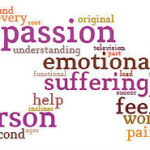Anger cannot be overcome by anger. If a person shows anger to you, and you show anger in return, the result is a disaster. – Dalai Lama
What does that mean?
To me, this speaks to a fundamental truth of life. If you return anger for anger, you end up in a situation that can only get worse. Anger begets more anger, and anger will eventually escalate to violence. In this situation, even if you prevail, it’s hard to claim victory, as the issue that started the fight is still unresolved.
The response to anger needs to be something other than anger. Depending on your strength and the situation, you might use calm, kindness, compassion, or even love to help defuse the situation. Eventually, if you can continue to return something other than anger for their anger, you can help them become something that is other than angry. Once they are calm, you can begin a dialog, and try to resolve the situation.
Why is peaceful resolution of conflict important?
It is important because it is the only true way to resolve a conflict. You can ignore conflict, paper over it, you can diminish it’s level or intensity, but until you resolve conflict, it is always there. And it will come back to the fore, eventually. Like a monster movie or a slasher flick, the anger will continue to come back.
Compare the aftermath of World War I with the aftermath of World War II, specifically in Germany. In WWI, anger was met with anger, and after the war, anger remained in the form of reparations (where the loser pays the winner for damages). Instead, after WWII, the winners rebuilt the loser’s country. Hard to stay angry in the face of that much calm, kindness, compassion, and love.
Where can I apply this in my life?
Despite being a skinny kid, I had a bit of a temper when I was a young lad. It got me in trouble from time to time. I often met anger with anger, and it never ended well. Even if I won (which was not the usual outcome), the issue behind the anger remained.
Have you had any experiences like that? Have you been in a fight (physical, verbal, emotional or some combination) where there was a victor in the conflict, but the issue remained unresolved? Did the anger (or in a lesser form, resentment) ever go away? Or did it remain until the issue was resolved?
In my experience, the issue must be resolved before the anger can fade. That doesn’t mean you will be happy with the resolution, because you don’t always get your way. Sometimes you get out-voted, or a higher authority decides the situation. But in any case, the issue is now resolved.
But how do you deal with someone who is directing anger at you? Grab some paper and write down how you handled the last few confrontations with an angry person. Specifically, write down what they were angry about, and how you responded. If the underlying situation was resolved, note that as well.
Take a look at how you dealt with angry people. Do you see any patterns? I use the plural here, as I noticed I reacted differently at work than at home. How often do you “stand your ground” and get angry right back at them? How often did that result in the people involved getting the issue properly settled?
I found that in the situations where I escalated the situation by returning anger for anger, things rarely ended well, where ‘well’ is defined as a peaceful solution to the underlying problem. Often the situation was then ‘resolved’ by an outside authority, which didn’t take into account any of the points either party was trying to make. Be it parents, the boss, the police or the University, it didn’t end well at all.
Look back at each of the events you wrote about and consider what you might have done differently. I threw out four possibilities earlier (calm, kindness, compassion, and love), feel free to use your own, as this is about you and your solution to another’s anger. Put a couple of words down next to each event, ones you think would have helped defuse the situation and give both parties a chance to come to a proper solution.
Did you notice a pattern in your new ideas about how to deal with angry people? Keep in mind that everyone is different, and you’ll have to try a few times to see what works best for you, and in which situations. Like the rest of life, every time is a little different.
Now that you have some ideas, you just have to drill them in. Conscious competence is my usual route, recognizing that I am getting angry, and choosing a different path. It isn’t always easy, but new habits rarely are. Keep practicing and it will eventually become your automatic response to an angry person.
As an aside, did you feel a little stress when you were first writing about the situations? How do you feel now? Do you feel less stressed now that you spent some time thinking about better ways to deal with angry people? I know it worked that way for me.
When you can meet anger with compassion, you can truly change the shape of the argument. Once you can show your kindness, you can begin a dialog, and start to work on the actual problem. And that is the true reward, to find a solution without having to resort to anger or violence.
From: Twitter, @DalaiLama
confirmed at : it’s his own feed…
Photo by mdanys








“Anger cannot be overcome by anger. If a person shows anger to you, and you show
anger in return, the result is a disaster. | philosiblog”
honestly enables myself imagine a somewhat further.
I personally appreciated each and every single section of it.
Thank you ,Evie
Thank you for the kind words.